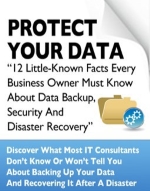
August 2018

Employees Keeping Your Data Safe? Don’t Count On It.
One morning late last year, an unemployed man was making his way across London, heading to the library to continue his job search. But on the way, he encountered something peculiar: a USB stick, peeking out among the fallen leaves and shining in the morning sun. Not thinking much of it – and perhaps afflicted with a morbid curiosity – he popped the device into his pocket and continued on his way. Once he made it to the library, he connected the USB to a computer to check out its contents. As he clicked around, he realized with a shock that this was a treasure trove of security information for the Heathrow International Airport: 174 folders packed with maps detailing CCTV camera locations, labyrinthine tunnels snaking below the building and even the exact route the Queen takes when she uses the airport.
Understandably worried, the man quickly ejected the device and brought it – for some reason – to local tabloid the Daily Mirror. Today, despite a full-scale security investigation by the airport and the scrutiny of dozens of police and security experts, it’s still unclear just where this extremely sensitive data came from. However, all signs point to the USB drive being dropped by either a hapless employee carrying around a national security concern in their pocket or a less-hapless employee looking to instigate a national security crisis.
Either way, the story hammers home a vital point: whether you’re an international airport hosting more than 70 million travelers each year or a small business with less than $10 million in annual revenue, your biggest security risk isn’t some crack team of hackers – it’s your employees.
Sure, you may chuckle at the idea that any of your employees would actively wish your organization harm. But we’re willing to guess that you probably underestimate the wrath of an employee scorned. Even if you treat your team better than any boss in the world, they are still human – which, of course, means they’re going to make mistakes from time to time. And when considering the cyber security of many SMBs, “time to time” actually means every day, leaving huge openings in your digital barriers. These errors don’t much matter, really – until the day that a hacker turns an eye toward your business and immediately realizes the laughable security gaps your team is leaving for them to exploit.
“Your biggest security risk isn’t some crack team of hackers – it’s your employees.”
The thing about cyber security is that it’s a lot more complicated than most people are willing to admit. Today’s digital landscape is fraught with hazards, a thousand little mistakes to be made at every step, resulting in a million workarounds for cyber criminals to use. Even the most tech-savvy among us probably don’t know everything about cyber security, and very few have as much knowledge as the hackers on the other end of the equation. When you consider the uncertainty and potential miseducation of your employees, many of whom probably know next to nothing about cyber security, you might start to feel a little panicked.

The battle against digital threats can seem like an endless slog – a war that the good guys seem to be losing – but luckily, when it comes to the security of your business, there are ways to batten down the hatches without dropping a ton of cash. For instance, start with your biggest vulnerability: your team. When a new employee joins your organization, they should go through a thorough cyber security training. Their welcome forms should include comprehensive rules about security policies, from using strong passwords to how they should respond to potential phishing attempts. Deviating from these policies should come with serious consequences.
As for your existing employees, train them up! We can help you build a robust education program to get every single member of your organization up to speed on the most imminent cyber security threats. But even then, cyber security isn’t a one-and-done kind of thing; it requires constant vigilance, regular updates on the latest trends and a consistent overall commitment to protecting your livelihood. Without training and follow-up, even the most powerful of cyber security barriers are basically tissue paper, so put some thought into your team in addition to your protections, and you can drastically increase the safety of the business you’ve worked so hard to build.
Referral Program Offer


The Culture Code
By Daniel Coyle
Many small-business owners seek to ape the strategies of their bigger cousins, looking toward the future in every aspect except one: culture. But what these small-minded leaders fail to realize is that, prior to hiring the best employees possible and having them do their best work, prior to nearly everything else, culture must be considered, because it’s the driving force that makes successful businesses tick.
In Daniel Coyle’s best-selling book, The Culture Code, he unpacks the complicated subject of company culture, starting from the basics and delving into the intricacies of some of the world’s best organizations. What he discovers is that, even in teams as disparate as the Navy SEALs and the Upright Citizens Brigade, there are common behaviors and processes that foster work capable of truly changing the world.
FREE Report: 12 Little-Known Facts Every Business Owner Must Know About Data Backup And Disaster Recover

You will learn:
- The only way to know for SURE your data can be recovered if lost, corrupted or deleted – yet fewer than 10% of businesses have this in place.
- Seven things you should absolutely demand from any off-site backup service.
- Where many backups fail and give you a false sense of security.
- The No. 1 cause of data loss that businesses don’t even think about until their data is erased.
Claim your FREE copy today at
www.rangersolutions.com/12facts
8 Tendencies Of Bad Decision Makers
At one point in my career, after I’d started, grown and sold a couple of businesses, I thought I knew everything there was to know about making good decisions. After all, I was a success! But it took me a few years to realize that, in many respects, I still had a lot to learn about making the best calls. Here are the lessons I learned the hard way back then about the tendencies and motivations of people who are making the worst business decisions of their lives.
BASING DECISIONS ON EGO
If you think you know it all and that your expertise in a narrow field will translate to every other field, you’re just flat wrong. Assemble a team of folks whose experience rounds out your own and reap the benefits of multiple perspectives.
RELYING ON THE MOMENTUM EFFECT
There’s certainly some truth to the belief that past events can predict future events. The problem with this thinking, though, is that the world is constantly evolving. If you’re sticking with the tried-and-true and refusing to look at other options, you’re likely to misstep.
BEING LAZY
Entrepreneurs have to be hungry and curious. Make sure you’re looking at the whole picture, and at both the negatives and positives of any potential decision.
BEING INDECISIVE
If you’re putting off making a choice, you can end up limiting your options down the road. You may be right, you may be wrong, but don’t let yourself get cheated out of success.
GOING IT ALONE
You simply can’t understand all the options and complexities of a given situation on your own. Sometimes the best results come through compromise with a team you’ve assembled.
EXECUTING POORLY
Making a decision is only 10% of the process. The other 90% is the actual execution of that decision. If you fail to communicate the reasons for your decision to your staff, neglect to plan or follow up, or simply drop the ball, you’re not getting the job done. Make sure you implement your changes in a thoughtful, logical way.
SEEING THE TREES RATHER THAN THE FOREST
Good decisions are made with the big picture in mind. If you’re focused on putting out fires or only thinking about next week, you’re not going to be able to adequately plan ahead. Leave the short-term decisions to your trusted staff and devote your energy to the long term.
NOT BALANCING YOUR SOURCES
Abraham Lincoln was a great president, but it wasn’t just because he was a smart, thoughtful man. He surrounded himself with a cabinet comprised of his most bitter rivals, understanding the power of hearing from people other than “yes” men. Don’t fall into the trap of listening to sycophants who tell you only what you want to hear. By seeking out contrary opinions, you’ll avoid making decisions based on biased sources.
Shiny New Gadget Of The Month:

An Indoor, No-Hassle Cookout: The Kenyon City Grill
As we draw close to the end of summer, many of us are stowing our grills in preparation for the cooler months. Others never had a grill in the first place, banned by their lease from ever doing any sort of grilling. Regardless of the reason, pretty much everyone bemoans a grill-free existence, even if it’s only for a few months.
Enter the Kenyon City Grill, a handy grill for those of us who need to stay inside to cook up a hot dog or hamburger. With some complicated engineering tricks, the grill can cook anything you throw at it with virtually no smoke, far exceeding the requirements of city fire codes and preventing you from getting smoked out of your kitchen. Its $475 price tag may seem a little steep, but consider the convenience of grilling right from your kitchen, all year long – even if you’re in an apartment! – and you can quickly see the benefits.
What It Takes To Succeed

If there’s one characteristic common to all successful entrepreneurs, it’s that they are notoriously difficult to keep down. Even through the most embarrassing failures and toughest trials, they learn from their mistakes and keep pressing on.
Take Gary Nealon, for example. Before he was founder of the e-commerce consulting firm Nealon Solutions, he built multiple multimillion-dollar businesses from the ground up – but not before experiencing a nasty failure that put him into bankruptcy. Now, he’s compiled his hard-earned lessons into a book called Notes to a Young Entrepreneur, hoping to equip newbies with the wisdom he wishes he’d had when he first started out. In it, he emphasizes the important lesson that no matter how hard an entrepreneur falls, they need to be able to actively learn from their mistakes and continue moving forward.
The Top 5 Business Apps To Improve Your Productivity

In the light-speed world of modern business, workers need every bit of help they can get. Luckily, new apps are developed every day that make our lives easier. Here are five of the best:
Documents To Go allows users to open and edit Microsoft Office 2007 files from any smart device. While that may seem a simple task, if your company frequently uses the Office Suite, Documents To Go can make a big difference.
Evernote has been making waves for a few years now with its seamless approach to notetaking and file-keeping. It enables users to upload virtually everything they need to the cloud and is especially useful for those quick thoughts you jot down during key work meetings.
If it’s strictly file syncing you need, check out SugarSync. A free account gets you 2GB of shared storage between two computers and your phone, accessible from anywhere.
Remember the Milk is one of the premiere apps for to-do listers everywhere, syncing complex lists across multiple platforms with little effort.
And you can’t forget Skype, perhaps the best tool for cutting down long-distance charges and communicating via chat, video and audio with far-flung colleagues. LifeWire.com, 5/17/2018
9 QUICK TIPS TO PROTECT YOUR BUSINESS FROM CYBER-ATTACK
Cyber security is more important than ever, but it doesn’t have to be complicated.
Just follow these rules and you’ll be well ahead of the game:
- Only use secure networks.
- Encrypt your data – it’s easier than it sounds.
- Install a strong firewall.
- Install patches and updates as soon as they become available.
- Do your research on the most common cyberthreats (you’d better know what phishing is).
- Develop a company-wide cyber security policy
- Make sure your business WiFi router is protected by the WPA2 standard. (Look it up.)
- Install software that insulates you from malware.
- Get SSL (Secure Sockets Layer) Certificate Protection, especially if you take payments online. SmallBizTrends.com, 4/25/2018



